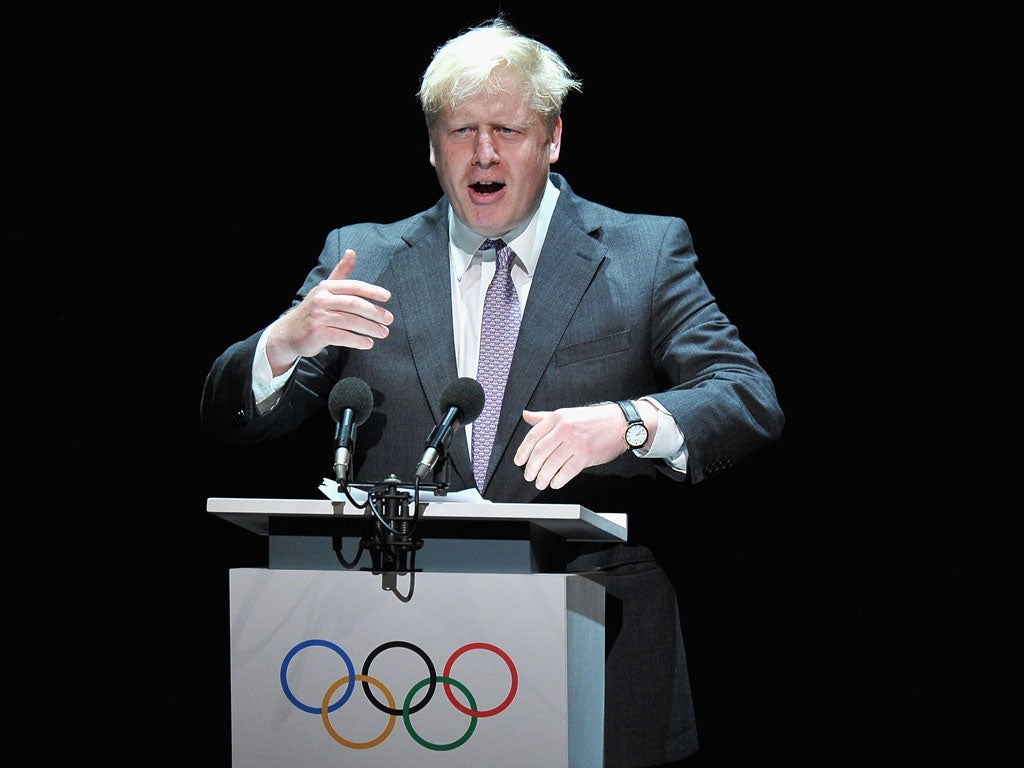John Rentoul: Dave fights old wars, but Boris looks in tune with the future
The London Mayor's record in office is thin, but his appeal is undoubted and he wants Cameron's job. Will his party be able to resist?


This column may have given the impression in the past that Boris Johnson was an unserious politician who was most unlikely to become prime minister. However, it has been drawn to our attention that seriousness, consistency and a record of delivery may be less important than previously thought. I am not saying that I was wrong, as such, but I ought to record that something has happened.
One sign of this was the opinion poll published this month by Michael Ashcroft, the Tory peer. The survey was carried out in May and found that, of 10 politicians, only two recorded a positive net rating with voters: Boris Johnson and William Hague. Boris, at +23, was well ahead of Hague on +7. All the others were negative, ranging from David Cameron and Ed Miliband, both on -2, to George Osborne on -16 and Theresa May on -17. Hague's persistent popularity is an enduring mystery. One can only assume that it is a combination of the British love of a loser and of the deadpan delivery of jokes. But Boris has broken through into a different category.
He seems to be rated on a different scale from normal politicians – compared by the voters to Stephen Fry, Usain Bolt and JLS. Which means that his appeal has the kind of demographic reach of which normal politicians can only dream. Lord Ashcroft's research found that he was particularly popular with voters who were "considering" voting Tory or who voted Tory last time but were now intending to vote for another party.
That Boris is outside the norm should have been obvious when he was re-elected as London Mayor in May, just before Lord Ashcroft's poll was carried out. He defied a trend against the Conservatives nationally. And the poll's findings were confirmed by the Mayor's two-minute speech in Hyde Park last week, which was interrupted by chants of "Boris, Boris" from a crowd who had come to see the last leg of the torch relay. Suddenly, the assumption that the Olympics would give Cameron a lift seemed in doubt. What if it were Boris who captured the excitement of the Games, leaving the Prime Minister looking like a wet blanket from Whitehall? The contrast was striking between Boris, with his £29.50 haircut on a rock-star stage in Hyde Park, belting out one-liners about "more gold, silver and bronze medals than we need to bail out Greece and Spain together", and Cameron, at the Olympic Park that still looked like a building site, his more expensive hair blowing in the wind, talking about "bad people wanting to do bad things" and thanking the police and intelligence services for being "fully joined up and working together".
There are many reasons why Boris should not be prime minister. His record as Mayor has been thin. He got rid of bendy buses, a small if significant achievement. Beyond that, he has taken the credit for the work of others. The Boris bikes were Ken Livingstone's idea (and are sponsored by Barclays, who must be just as miffed). As for the Olympics, it is worth remembering that, if it had not been for Tony Blair, we would have been watching the opening ceremony in Paris. Although Boris laid claim to London's Games with his "whiff whaff" speech in Beijing four years ago, he and Cameron are both trying to seize a baton that is nearly over the finishing line.
Their rivalry is hard to assess, because the British system is not used to politicians making their way to the top outside the House of Commons, via the London mayoralty and television celebrity. In their biography of the Prime Minister, James Hanning and Francis Elliott write that what the two have in common, apart from Eton and ambition, is "the well concealed surprise aroused in both men by the other's success".
Cameron must be especially surprised and alarmed by Boris's popularity this weekend. It makes the Prime Minister, the younger man, look old-fashioned. It makes Boris look like someone in tune with the future, while Cameron looks like a Major-Blair-Brown era politician still fighting past wars.
So Boris Johnson has potential. It is still hard to see a path to No 10 for him. His second term as Mayor of London runs until 2016, when the general election is supposed to be the year before. If Cameron wins re-election, that settles it for another five years. If not, would Boris be any use as Leader of the Opposition? Would he even be back in the Commons? There are hints in the wind. Rafael Behr, the new political editor of the New Statesman, reported last week that Johnson had told aides that he intends to perform his mayoral duties on "an unofficial part-time basis after the Olympics", and there is nothing in law to stop the mayor being an MP (indeed, Ken Livingstone was both in 2000-01).
Boris has the beginnings of a Churchillian stature about him. He now has the size of personality that is waiting for a crisis that will summon him to greatness. It could be the collapse of the eurozone, on which he has positioned himself just to the Eurosceptic side of Cameron, Osborne and Hague. If the polls should tell the Tories that he, and he alone, can save the party, the party may find a way.

Join our commenting forum
Join thought-provoking conversations, follow other Independent readers and see their replies